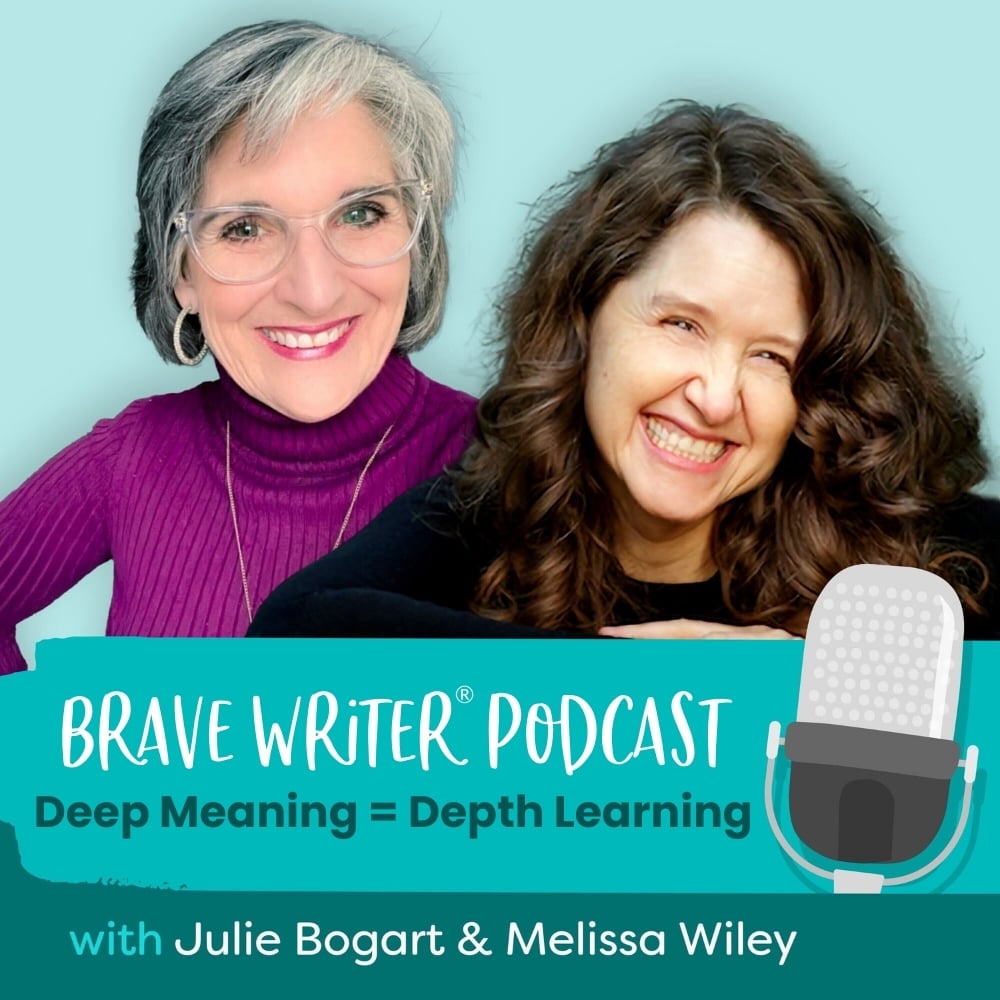[Podcast #281] Deep Meaning = Depth Learning

Do you ever wonder why some lessons stick and others fade away?
In this Brave Writer podcast episode, we explore the concept of deep meaning—the essential ingredient behind lasting, joyful learning. When kids connect personally with what they’re learning, they move beyond memorization into true expertise. We:
- unpack the difference between mastery and meaning,
- share real-life examples from homeschooling life (yes, video games and comic books count!), and
- offer practical questions you can ask to build more meaningful learning moments at home.
Listen now to discover how to help your kids not just think, but care about what they’re learning.
Show Notes
In every learning experience, there’s a pivotal question waiting to be answered: “Why do I need to know this?” It’s a question we’ve all heard from our kids—and maybe even asked ourselves. When children ask this, they’re not simply being resistant. They’re pointing to something deeper. They want to understand the meaning behind what they’re learning.
What if, instead of focusing on mastery through memorization, we shifted our educational focus to meaning? That’s where true learning—the kind that sticks—really begins.
Mastery vs. Expertise
We often conflate “mastery” with success: a child memorizes a grammar rule or completes a worksheet correctly. But real expertise goes beyond that. It involves a felt sense of how knowledge fits into a broader framework. It’s the difference between identifying a hyperbole on a test and joyfully recognizing it in a read-aloud story. One is performance. The other is evidence of integration—of natural knowledge built on passion and relevance.
Meaning Drives Passion
When learning taps into a child’s deep meanings—their interests, relationships, curiosities—it unlocks a sense of purpose. This is true whether they’re exploring the economics of crops in a farming game, testing physics in Angry Birds, or reading about their favorite superheroes. We tend to elevate subjects like violin, poetry, or chess as “prestigious,” while dismissing games or pop culture as frivolous. But children don’t see that hierarchy—they’re driven by what sparks their engagement, not what looks good on a transcript.
Experience Builds Understanding
Real learning requires more than facts—it needs context and experience. Just like a child learns the power of scissors by cutting the fur off a beloved stuffed animal, learning needs to be hands-on. Tracing tanks from a history book, graphing fallen leaves in the front yard, or building a model of Helm’s Deep while listening to Tolkien—all of these create neural interconnections that form lasting knowledge. It’s not about rushing to mastery but slowing down to build meaning.
Learning That Feels Like Play
The best learning often doesn’t look like school. It looks like play. It looks like kids constructing domino patterns, arguing over where to place index cards in a homemade history timeline, or sitting quietly with a nature journal. These are not distractions from learning—they are learning. When kids care about what they’re doing, they:
- challenge themselves naturally,
- cope with mistakes, and
- absorb information more deeply.
Our Role as Parents
As educators and caregivers, our job is not to manufacture meaning, but to create the conditions for it to emerge. That means offering rich, varied experiences, and sometimes stepping back to let our kids make the connections themselves. Especially as they get older, they begin to link content to their lives in new and unexpected ways—and our job is to listen and support.
Deep learning comes from deep meaning. When we prioritize our children’s curiosity and let their passions shape their educational journeys, we invite them into a lifetime of caring, thinking, and discovering. That’s not just good education—it’s good living.
Resources
- Check out Julie’s new author website: juliebogartwriter.com!
- Subscribe to Julie’s Substack newsletters: Brave Learning with Julie Bogart and Julie Off Topic
- Try out our Brave Writer Practice Pages
- Learn more about the Brave Writer Literature & Mechanics programs
- Read all Brave Writer class descriptions
- Start a free trial of CTCmath.com to try the math program that’s sure to grab and keep your child’s attention
- Sign up for our Text Message Pod Ring to get podcast updates and more!
- Send us podcast topic ideas by texting us: +1 (833) 947-3684
Connect with Julie
- Instagram: @juliebogartwriter
- Threads: @juliebogartwriter
- Bluesky: @bravewriter.com
- Facebook: facebook.com/bravewriter
Connect with Melissa
- Website: melissawiley.com
- Substack: melissawiley.substack.com
- Instagram: @melissawileybooks
- Bluesky: @melissawiley.bsky.social
Produced by NOVA


















